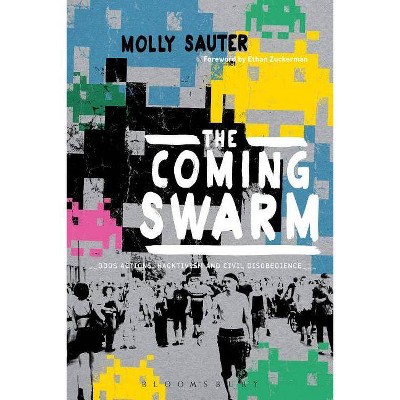The Coming Swarm - by Molly Sauter (Paperback)

Similar Products
Products of same category from the store
AllProduct info
<p/><br></br><p><b> About the Book </b></p></br></br>"This book examines the history, development, theory, and practice of distributed denial of service actions as a tactic of political activism. The internet is a vital arena of communication, self expression, and interpersonal organizing. When there is a message to convey, words to get out, people to organize, many will turn to the internet as a theater for that activity. As familiar and widely accepted activist tools--petitions, fundraisers, mass letter-writing, call-in campaigns and others--find equivalent practices in the online space, is there also room for the tactics of disruption and civil disobedience that are equally familiar from the realm of street marches, occupations, and sit-ins? Grounding the analysis historically, focusing on early deployments of activist DDOS as well as modern instances to trace its development over time, this book uses activist DDOS actions as the foundation of a larger analysis of the practice of disruptive civil disobedience on the internet"--<p/><br></br><p><b> Book Synopsis </b></p></br></br><i>This book is available as open access through the Bloomsbury Open Access programme and is available on www.bloomsburycollections.com.</i><br/><br/>What is Hacktivism? <br/><br/>In <i>The Coming Swarm</i>, rising star Molly Sauter examines the history, development, theory, and practice of distributed denial of service actions as a tactic of political activism. The internet is a vital arena of communication, self expression, and interpersonal organizing. When there is a message to convey, words to get out, or people to unify, many will turn to the internet as a theater for that activity. As familiar and widely accepted activist tools-petitions, fundraisers, mass letter-writing, call-in campaigns and others-find equivalent practices in the online space, is there also room for the tactics of disruption and civil disobedience that are equally familiar from the realm of street marches, occupations, and sit-ins? With a historically grounded analysis, and a focus on early deployments of activist DDOS as well as modern instances to trace its development over time, <i>The Coming Swarm</i> uses activist DDOS actions as the foundation of a larger analysis of the practice of disruptive civil disobedience on the internet.<p/><br></br><p><b> Review Quotes </b></p></br></br><br>Do two wrongs ever make a right? Sauter deftly shows how the injustices of our asymmetrical media landscape motivate and in some ways justify illegal online attacks. How much collateral damage to the network, if any, is ethical when lives are at stake in the real world? And how does public perception of hackers both inhibit and enhance the effectiveness of their efforts? While there may be no easy answers, <i> The Coming Swarm</i> is a landmark contribution to a conversation that needs to be initiated right now.<br/>Douglas Rushkoff, author, Present Shock and Program or Be Programmed<br><br>Questions about online protest tactics have never been more fraught-as the analog police militarize their response to legitimate dissent, so, too, have the Internet cops decided that any online protest is cyber-terrorism. Sauter's work places one of the most urgent political questions of the 21st century into much-needed context.<br/>Cory Doctorow, EFF Fellow and co-editor of Boing Boing<br><br>While DDOS actions have only recently entered the public consciousness, they have a vibrant history in the realm of political activism. Drawing on disciplines from political philosophy to social movement theory, Molly Sauter illuminates the importance of DDOS actions to modern democratic discourse, and contextualizes them in the evolution of political activism as it has moved from the streets to their elusive online counterparts.<br/>Jonathan Zittrain, Vice Dean for Library and Information Resources, Harvard Law Library and Faculty Co-Director, Berkman Center for Internet and Society<br><p/><br></br><p><b> About the Author </b></p></br></br><p><b>Molly Sauter</b> is a doctoral student at McGill University in Montreal in the department of Art History and Communication Studies. She holds a masters degree in Comparative Media Studies from MIT, and is an affiliate researcher at the Center for Civic Media at the Media Lab and the Berkman Center for Internet and Society at Harvard University. Her research is situated in socio-political analyses of technology and technological culture, and is broadly focused on hacker culture, transgressive digital activism, and depictions of technology in the media. Her work has been published in <i>The Atlantic</i>, <i>HiLow Brow</i>, <i>io9</i>, <i>The American Behavioral Scientist</i>, and the <i>MIT Technology Review</i>. Her research has been featured by <i>Popular Mechanics</i>, <i>BoingBoing</i>, the BBC, NPR, the CBC, <i>Der Spiegel</i>, and the <i>Christian Science Monitor</i>. She resides in Montreal, Quebec, and lives on the internet, blogging at oddletters.com and tweeting @oddletters.</p>
Price History
Price Archive shows prices from various stores, lets you see history and find the cheapest. There is no actual sale on the website. For all support, inquiry and suggestion messages communication@pricearchive.us




















